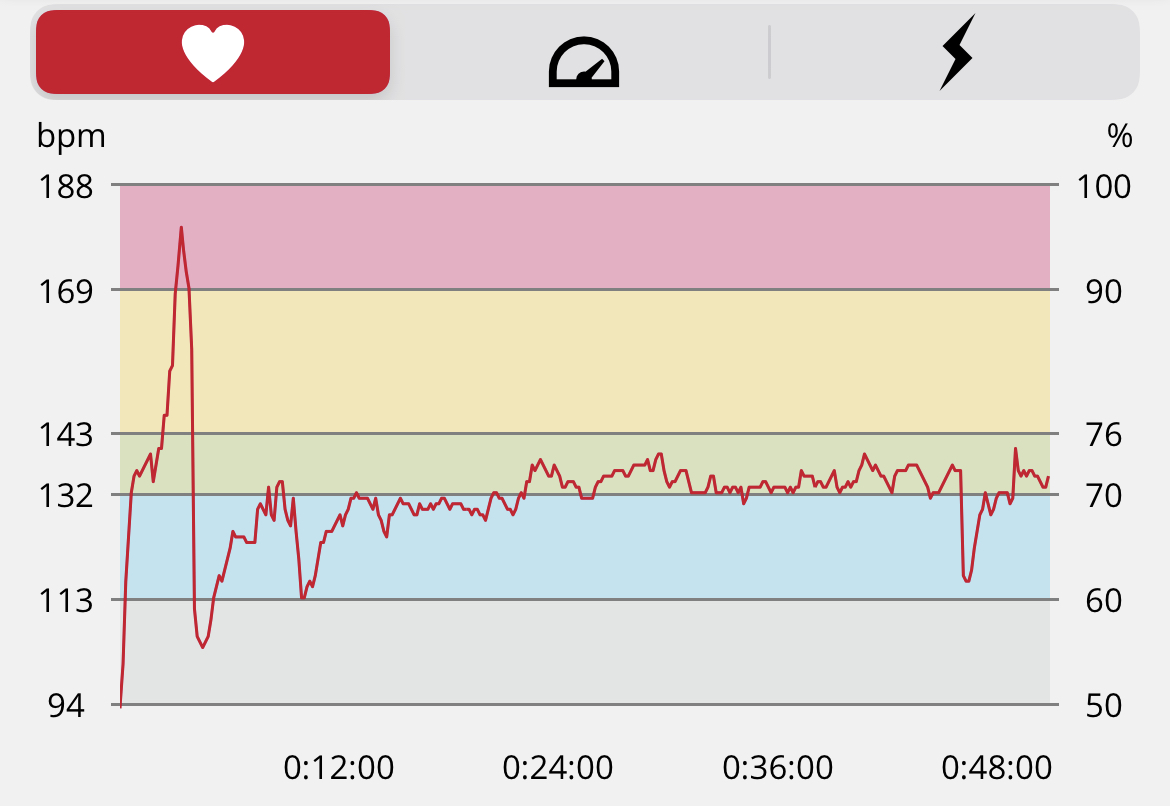How Can I Lower My Heart Rate While Running?
To lower your heart rate while running, slow down your pace and focus on deep breathing techniques. Running at a steady pace will help your body relax and reduce your heart rate.
Now let’s dive into some tips on how to incorporate these techniques into your running routine. Running is an essential part of a healthy lifestyle, and it’s a great way to stay fit and reduce stress. However, many people struggle to maintain a steady heart rate during their runs.
A high heart rate can cause fatigue, shortness of breath, and overall discomfort. Luckily, there are several techniques you can use to reduce your heart rate while running, including maintaining a steady pace, practicing deep breathing, and incorporating strength training exercises. We’ll explore these strategies and show you how to incorporate them into your running routine, so you can enjoy all the health benefits of running without any discomfort or strain on your heart.

Credit: www.medicalnewstoday.com
Breathing Techniques
Lowering your heart rate while running can be achieved through proper breathing techniques. Focusing on slow, deep breaths and coordinating inhalations with strides can help improve endurance and reduce stress on the cardiovascular system.
Breathing Techniques Controlling your breath while running can make a huge difference in your heart rate. When you improve your breathing technique, you’ll find that your heart doesn’t have to work as hard, and you can keep up your pace for longer. Two breathing techniques you can try are diaphragmatic breathing and 4-7-8 breathing.Diaphragmatic Breathing
Diaphragmatic breathing, or belly breathing, involves breathing deeply from your abdomen instead of your chest. When you inhale, expand your stomach, and when you exhale, contract it. This method of breathing helps you take more oxygen into your lungs with each breath, and as a result, you increase your oxygen intake. The majority of people breathe from their chest, so it takes time and practice to switch to diaphragmatic breathing. However, persisting with practice helps you master this breathing technique.4-7-8 Breathing
4-7-8 breathing technique is a breathing pattern that involves inhaling through the nose for four seconds, holding the breath for seven seconds, and exhaling through the mouth for eight seconds. This breathing technique is effective in reducing anxiety and stress, lower blood pressure, and promoting relaxation. It is an excellent way to calm yourself down and reduce your heart rate while running. When running, the body requires more oxygen, so the 4-7-8 breathing method slows everything down. Using breathing techniques while running lowers your heart rate, helps you conserve energy, and makes your run more pleasant. Try incorporating these techniques into your running routine, and see how they work for you.
Credit: www.runtothefinish.com
Pace Management
Pace management is the key to lowering your heart rate while running. By controlling your pace and focusing on your breathing, you can improve your cardiovascular fitness and reduce the strain on your heart. It is important to listen to your body and adjust your pace accordingly to achieve the best results.
Gradual Increase In Pace
Gradual increase in pace while running is one of the best ways to lower your heart rate. It is important to start with a slow and steady pace and increase it gradually. This helps your heart to adapt to the exercise and reduces the risk of sudden spikes in heart rate. Not only does this reduce the stress on your heart, but it also helps you run more efficiently.Interval Training
Interval training involves alternating periods of high intensity and low-intensity exercise. This is an effective way to improve your cardiovascular fitness and lower your heart rate during running. By alternating between high-intensity running and recovery periods, your heart rate will gradually lower, making it easier for you to run for longer periods without experiencing fatigue.Effective Pace Management
Effective pace management is key to lowering your heart rate while running. Make sure to monitor your heart rate while running and adjust your pace accordingly. Identify a pace that feels comfortable and sustainable for you. You may want to use a heart rate monitor device so that you can keep an eye on your heart rate and adjust your pace as needed. Additionally, try to maintain a consistent pace instead of speed variations while running. Overall, pace management plays a vital role in lowering your heart rate while running. Gradual increase in pace, interval training, along with monitoring your heart rate and maintaining an effective pace, can all contribute to lower your heart rate while running. So, it’s important to practice these techniques to improve your running performance and reduce the risk of any heart-related problems.Proper Hydration
Want to lower your heart rate while running? Proper hydration is key. Make sure to drink enough water before, during, and after your run to keep your body properly hydrated and prevent your heart rate from rising too high.
Proper hydration is a crucial aspect of lowering your heart rate while running. Keeping your body adequately hydrated before, during, and after exercise helps regulate your body’s temperature and prevent dehydration. Here are two essential factors for proper hydration:Water Intake Before and During Exercise
To lower your heart rate, start by drinking water before your workout. Drinking water at least 30 minutes before running helps to pre-hydrate your body. Also, stay hydrated during intense workouts by replenishing with water at scheduled intervals. Take small sips rather than drinking too much water at once, which can cause stomach cramps and discomfort.Avoiding Dehydration
Dehydration can lead to a significant increase in heart rate, which can affect your running performance. To avoid dehydration, make sure to drink enough water throughout the day, especially during hot and humid weather. You can also rely on water-rich foods and beverages like fruits, vegetables, and coconut water. Remember to listen to your body’s hydration needs. If you experience symptoms of dehydration, such as dry mouth or fatigue, stop and rehydrate immediately.Conclusion
Keeping yourself hydrated is key to lower your heart rate while running. By drinking water before, during, and after exercise, you can maintain optimal hydration levels and prevent dehydration. It’s an easy way to improve your overall running performance and keep your body functioning at its best.Cool-down Exercises
Lowering your heart rate after running is crucial. Cool-down exercises like slow walking or jogging, stretching, and deep breathing can help you gradually decrease your heart rate and prevent any strain on your muscles.
Slow Jogging
After an intense running session, it is crucial to gradually ease out of it, which can be achieved through slow jogging. Reducing your pace and running at a moderate speed for a couple of minutes helps your heart rate gradually decrease, preventing it from abrupt changes that can negatively affect your cardiovascular system. Slow jogging also helps to gradually lower the body temperature, preventing the onset of muscle aches and cramps, which can be quite uncomfortable.Stretching
Stretching is a vital part of the cooldown process as it helps to relax your muscles, reducing the risk of stiffness and cramps. Gentle stretching exercises such as calf stretches, hamstring stretches, and quad stretches should be performed for approximately 10-15 seconds per stretch. Avoid bouncing movements as they can lead to small tears in your muscles. Instead, hold each stretch in a static position, keeping your muscles relaxed but in a state of tension.Hydrate
It is essential to drink plenty of water during and after your run. Being hydrated helps to keep your blood pumping efficiently, regulating your heart rate during your workout. Additionally, hydration helps to replenish the fluids lost through sweat, preventing dehydration and the associated adverse effects. If you prefer a flavored drink, consider adding a pinch of salt and some fresh citrus slices to your water, which can help to replace electrolytes lost during intense workouts.Breathe Deeply
Breathing exercises can help to regulate your heart rate after exercise. Inhaling deeply and exhaling slowly through your mouth helps to slow the heart rate, providing a sense of calm to the body. As you inhale, allow your abdomen to expand, filling your lungs with air, and as you exhale, slowly release the air from your lungs while contracting your abdomen. Repeat this breathing exercise several times, and you’ll start feeling your body and heart rate relaxing.Conclusion
Cool-down exercises are essential to reduce your heart rate after running and maintain your cardiovascular health. Slow jogging, stretching, hydration, and breathing exercises can all help to slow your heart rate, relax your muscles, and prevent injuries, making them essential components of any running routine. By taking the time to cool down after a run, you are setting yourself up for success in your future workouts.Other Factors
Other factors that can help lower your heart rate while running include staying hydrated, gradually increasing your intensity, and incorporating relaxation techniques such as deep breathing or meditation. Additionally, maintaining good overall health through a balanced diet and regular exercise can also improve your heart rate during running.
Apart from physical factors, there are other aspects that can affect your heart rate while running. In this section, we will discuss two key factors that can significantly impact your heart rate: Quality of Sleep and Stress Management.Quality Of Sleep:
The quality of sleep you get at night can significantly affect your heart rate while running. Lack of quality sleep can lead to increased levels of stress, which in turn can cause elevated heart rates. It’s vital to ensure that you’re getting enough quality sleep to lower your heart rate. To improve your sleep quality, consider the following tips:- Create and stick to a sleep schedule
- Avoid caffeine, alcohol, and nicotine at least six hours before bedtime
- Keep your bedroom dark, quiet, and cool
- Avoid using electronics before bedtime
- Engage in relaxing activities before bed, such as reading or yoga
Stress Management:
Stress is a major factor that can cause an elevated heart rate while running. In today’s fast-paced world, stress is almost inevitable, but managing it can significantly improve your heart rate while running. Here are some basic stress-management practices that can help:- Take deep breaths and calm yourself before a run
- Practice meditation or yoga to reduce stress levels
- Avoid overthinking and negative thought patterns
- Speak to a mental health professional if you’re struggling to manage stress
- Engage in activities that bring you joy and help you relax, such as reading or listening to music

Credit: rehab2perform.com
Frequently Asked Questions Of How Can I Lower My Heart Rate While Running?
Why Is My Heart Rate High When I Run?
When you run, your heart rate increases to supply more oxygenated blood and nutrients to your muscles. This is because your muscles require more energy when you exercise. The harder you run, the faster your heart will beat to meet this increased demand.
This is a normal physiological response to exercise.
Is 170 A High Heart Rate When Working Out?
Yes, 170 is considered a high heart rate when working out. It’s important to keep your heart rate within a safe and effective range for your fitness level. Consult with a healthcare professional or certified personal trainer to determine your target heart rate during exercise.
Is A Heart Rate Of 190 Bad When Running?
Heart rate of 190 when running is not necessarily bad, but it depends on your age and fitness level. Typically, younger and fitter individuals may have a higher heart rate while exercising without adverse effects. However, consult a doctor if you experience discomfort, chest pain, or lightheadedness.
Conclusion
Incorporating the methods listed above into your running routine can help reduce your heart rate, improve your overall performance, and allow for a more enjoyable workout experience. Finding the ideal pace, taking adequate time for warm-ups and cool-downs, practicing breathing techniques, hydrating properly, and building up your endurance are all great ways to achieve your running goals while keeping your heart rate within safe limits.
So, lace-up those sneakers and hit the pavement with confidence knowing that you can effectively lower your heart rate while running.







